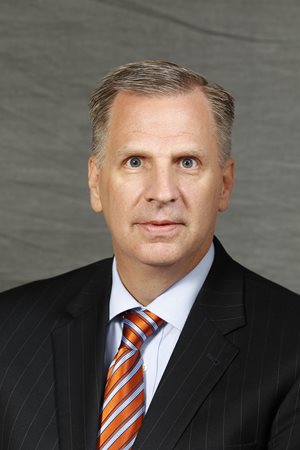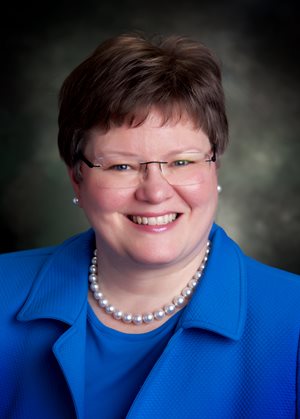In its efforts to establish and improve financial accounting and reporting standards, the Financial Accounting Standards Board (FASB) must navigate various perspectives from parties such as regulators, preparers, investors, and audit firms. At this year’s Current Financial Reporting Issues (CFRI) Conference, FASB Member Marsha Hunt and Vice Chairman James Kroeker will explore how the FASB successfully engages in this balancing act, what their perspectives are on the state of adoption of new standards, how they view their role after a standard is written and what they see as their next big ticket items.
FEI Daily spoke with Hunt and Kroeker ahead of the conference.
FEI Daily: Why do you feel it's important that the FASB is represented at CFRI every year?
 James Kroeker: One reason is that the relationship between FASB and FEI has served us both incredibly well. It helps us understand the impact of our standards throughout their lifecycle. FEI feedback provides insight into important questions. For example, does a standard improve financial reporting? If so, at what cost? What are the practical challenges? What are preparers dealing with, other than accounting standards?
James Kroeker: One reason is that the relationship between FASB and FEI has served us both incredibly well. It helps us understand the impact of our standards throughout their lifecycle. FEI feedback provides insight into important questions. For example, does a standard improve financial reporting? If so, at what cost? What are the practical challenges? What are preparers dealing with, other than accounting standards?
It really helps inform our process while we develop a standard, and even after the standard has been issued. For example, is the final standard being implemented the way the board intended? Are there unintended consequences? We've experienced this with revenue recognition and the TRG [Transition Resource Group]. Some amendments were made largely because of ‘boots-on-the-ground” people implementing the standard asking us, ‘is this really what the board intended? And at what cost?’
After a standard is implemented, [FEI feedback] helps us understand the consistency of application and whether the standard is achieving its objective. We get a lot of benefit at the FASB, and I hope FEI members see the corollary to that, namely, their ability to directly interact with standards throughout the entire lifecycle.
 Marsha Hunt: I have a high regard for FEI, having been a member for decades, and previously involved in the leadership of the organization. CFRI is the only preparer based conference of its stature of which I am aware.
Marsha Hunt: I have a high regard for FEI, having been a member for decades, and previously involved in the leadership of the organization. CFRI is the only preparer based conference of its stature of which I am aware.
When I was involved in planning the CFRI conference as its chair, I always felt one of the competitive advantages of this conference is the access it provides participants to senior leaders in the industry.
As a result [Chief Accountant for the U.S. Securities and Exchange Commission] Wes Bricker makes the time to attend and FASB members make the time to participate. The questions from the attendees in the Q&A discussions at the conference tend to be different from the questions we receive in other venues due to the preparer orientation. The consistency and high caliber of this conference is one reason it has been so successful for so long.
FEI Daily: You mentioned FEI as being a channel for gathering feedback. Live events obviously being another. What are some of the other channels for gathering stakeholder feedback?
Kroeker: We have numerous other channels. In addition to FEI, we have advisory groups that provide broad input, member companies, other preparers, private companies, academics, investors, and public accountants. We have an advisory committee focused solely on small business. We have an investor advisory committee. We have an academic resource group.
We get input through other organizations that include preparers, but probably not as exclusively preparers. For example, IMA and its financial reporting committee, which is focused on preparers, but also includes the perspective of auditors, external advisors, investors, and academics as well.
We also get input from the CFA. There are probably a dozen-or-more groups that have either annual, semi-annual, or periodic liaison meetings with us. It runs the gamut from the very industry-focused, to the broader preparer, all the way up to multi-constituent input.
That's how we get input, I would say, less formally. Then, of course, we issue formal exposure drafts for public comment. During the comment letter process, the same groups, and many others, tend to comment on any significant proposal and share their perspectives.

Hunt: The theme of our panel, "The FASB: Standards That Work,” is actually picking up on the theme from the Financial Accounting Foundation’s most recent annual report. Hopefully, the standards do work, because of this outreach. I would expect that our discussion will touch on the importance of the outreach process in the standard setting agenda.
FEI Daily: How does the FASB manage to navigate and find a balance between the different perspectives from regulators, preparers, investors, audit firms?
Hunt: That's the job description.
Kroeker: That’s probably the biggest challenge in standard-setting. It really starts with going back to what our mission is, which is to establish standards that improve the usefulness of information that's provided to users of financial statements.
That doesn't mean that every constituency doesn't have an equal importance in terms of their perspective. But the first question we always go back to is, does this improve the decision usefulness for the people using financials?
Secondly, we ask, does it do it at a reasonable cost? You can't improve financial reporting for the benefit of investors if you're not doing it at a reasonable cost to those who bear it, which ultimately are the providers of capital as well.
We need standards that are also auditable, so we have to hear not just from preparers, but also the people who secondarily provide assurance.
Taking all of that in, how do you weigh the information? We do it through a board that has differing backgrounds and expertise. We don't come in as board members that represent a particular constituency. We're here because we have expertise that helps us understand. To me, that's an important difference. My job isn't to be the person that represents auditors, or represents former regulators, but I bring that background, and Marsha brings a background that is very unique to the board as well. We don't have any other person who's sat for at least long periods of time in a preparer seat. We have those differential backgrounds that help us then be able to go in and say, ‘Hey Marsha, I'm thinking about it this way, but we have comments from XYZ Company, help me understand why they're concerned.’
I think it’s about bringing those different perspectives together, then saying collectively, ‘Do we think we're actually resulting in a meaningful improvement to reporting?’
FEI Daily: Marsha, what was your transition from controller at Cummins to the FASB
Hunt: One of my observations was the extent and diversity of the outreach is far greater than I had observed in my liaison roles with FEI and as a member of FASAC. There are more advisory councils than I realized and there are more unique stakeholder groups that feel passionately about certain issues that may be on the agenda from time-to-time. It was very clear to me in my first year how important it is to make sure our process allows the time for all those voices to be heard.
As Jim mentioned, we bring our unique experiences to the role of board member. I found the process at the FASB to be very welcoming and appreciative of diverse backgrounds.
I found I was engaged in the activities quickly. I have continued my relationship with CCR, attending quarterly liaison meetings. This ongoing and frequent connection will keep me in touch with the fast paced changes preparers experience and allow me to still be relevant as a connection point for both organizations.
FEI Daily: And Jim, you were previously at Deloitte before you became a board member?
Kroeker: Yes, I was at Deloitte and then at the SEC. At Deloitte, I was both a field auditor, and then in the national office, so followed very closely what the FASB was doing at the SEC. At the SEC, I was the chief accountant before coming to the FASB.
In terms of knowing what to expect, I found it to be, from the technical side, an relatively smooth transition. I'm not here just to represent an audit perspective, or just to represent a regulatory perspective. You have to continuously check yourself to say, ‘The objective isn't only to think about how would I audit, or how would I regulate the standard, but if I step back, how is this resulting in better finance reporting?’
I think it causes you to remember, ‘I have to make sure the whole system works.’
FEI Daily: What are you most looking forward to at this year’s CFRI?
Hunt: I haven't missed a CFRI conference since 1996. Last year Marc Siegel [former FASB Board Member] and I shared the table together. It was a lively discussion with two board members candidly addressing their particular views. Hopefully it gave participants an insight into what we're like as people, how we think, and insight to the process.
This conference will be held at a point-in-time where companies are anticipating and implementing new significant standards. I'm looking forward to the panel format and an opportunity to share our efforts to support the system through these implementation activities.